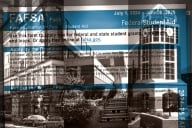You have /5 articles left.
Sign up for a free account or log in.
The U.S. Education Department needs to do more to ensure the billions of dollars it offers in financial aid aren’t wasted on students who fraudulently enroll in distance education programs, the department's Office of Inspector General has concluded in a critical new report.
The OIG audited eight distance education providers between 2009 and 2011 to assess how each college or university complied with Title IV of the Higher Education Act, which governs federal student grant, loan and work-study programs. Despite the Education Department’s efforts in recent years to curb cases of fraud where students enroll in courses to exploit those financial aid programs -- schemes known as fraud rings -- the audit found the institutions struggle to verify students’ identities and track their attendance and academic engagement.
“The 8 schools disbursed nearly $222 million to more than 42,000 distance education students who did not earn any credits during a payment period,” the report reads. “Collecting and analyzing sufficient and appropriate data would help the department appropriately address risks, proactively adapt policies to address those risks, and better target its school compliance monitoring.”
The audit even revealed a fraud ring operating at one of the institutions, which was not named.
Identity verification tops the list of recommendations outlined in the report, which urges institutions to reject the idea that a username and password are enough to guarantee that students are who they claim to be.
“A login and passcode ensure only that someone logging in to a course is using the same login and passcode assigned to the person who enrolled,” the report reads. “Without effective enrollment processes at a school, a login and passcode do not ensure that the person is enrolling under a valid name and intending to obtain an education.”
The report also asks the Education Department to establish a common definition of what it means to attend an online class. Of the eight audited institutions, some, such as Pennsylvania State University, “considered a student’s entering an online class via a secure login to be sufficient evidence of academic attendance.” Others, such as Liberty University, tracked participation on discussion boards and assignments, failing students if they didn't attend for 21 days in a row.
A clear definition of attendance could help institutions adjust Pell Grants for students who attend only some of the courses in which they enroll. The audit, which tracked $1.8 million awarded to 400 students across the eight colleges and universities, found a majority of the institutions retained too much of the Title IV funding in some cases and paid out to no-show students in others.
The OIG recommends institutions split the federal funding into smaller amounts, an idea borrowed from Ivy Tech Community College of Indiana, one of the audited colleges. Ivy Tech distributes Title IV funds based on modules, which are normally six to eight weeks long. Such a model could be less lucrative to scammers, who would have to remain enrolled for several modules to collect the full amount.
Finally, the report suggests universities should re-examine the cost of attendance for students in distance education programs to ensure that Title IV funds cover only educational expenses. The inspector general's office encourages the Education Department work with Congress to include such a provision in the Higher Education Act.
“By addressing these areas, the department will have greater assurance that Title IV funds are used for the intended purpose -- education -- and that the interests of taxpayers are protected,” the report reads.
In a response to a draft of the report, former Under Secretary of Education Martha J. Kanter said the department fully agreed with all but the last recommendation, as it “implies ... that Congress was unaware ... of the limitations on the calculation of cost of attendance for correspondence programs when it amended the law to specifically state that no distinction is to be made" between residential and distance education programs. She pointed out that Congress has already "sought to distinguish distance education from correspondence courses."
The department agreed in principle, though, and will “remind institutions of higher education that they should develop and use different standard costs of attendance for different categories of students,” Kanter wrote. “However, we will also reaffirm that, while institutions have the authority to use professional judgment to adjust the cost of attendance, the law limits such discretion to be exercised only on a case-by-case basis to allow for special circumstances, rather than circumstances that exist across an entire category or class of students."
Reps. George Miller and Rubén Hinojosa, Democrats of California and Texas, respectively, and high-ranking members of the House Education and the Workforce Committee, endorsed the report in a statement released Tuesday afternoon.
“Today’s report underscores the ongoing challenges we face in the unique environment of distance education, which is rapidly evolving and expanding,” the statement reads. “As we work to reauthorize the Higher Education Act, committee Democrats will carefully consider and evaluate ways in which we can incorporate the OIG’s recommendations to provide accountability for taxpayers while protecting the ability of campuses to continue innovating and experimenting with new educational models.”







